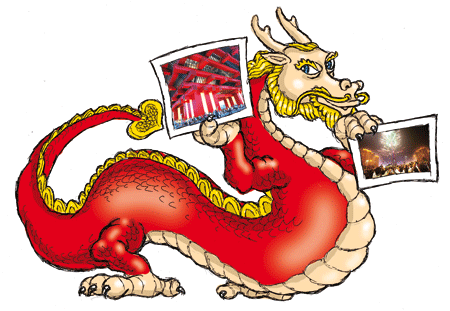Selling the friendly dragon
China has had some success projecting its positive, unthreatening image with glamorous events like the Shanghai Expo and Asia Games, but the world is not staying cool as Zhou Hanmin, deputy director of the Shanghai Expo Executive Committee had once hoped in April.
 |
|
Selling the friendly dragon |
"China will present its image to the world: a nation with great traditions, great ambitions, and the world should view China's future development with calm," he said before the global showcase started.
In fact, the image China has been projecting to the world has been only partially realized or recognized by the rest of the world.
"China's image in 2010 can be summarized by one word: contradiction," says Yu Jianrong, director of the Institute of Rural Development at the Chinese Academy of Social Sciences and one of in China's more influential public intellectuals.
"China has showed the outside world a positive image by successfully hosting international events and building more skyscrapers, but at the end of the day that cultivated positive image has been challenged."
From a backward country to a developing country, from Red China to Made in China, from China rise to China threat, China's image has been stereotyped through various clichés over the decades.
"The concept of China's image is not very clear," says Xiong Kunxin, a professor of ethnic theory and policy at the Minzu University of China in Beijing. "The country is looking for its right image to show the world the real China."
Fireworks dressed the sky for the opening ceremony of the World Expo on May 1, making a mark in history: the first time a developing country has hosted the event.
A total 246 participating countries and international organizations held exhibitions at the six-month event that attracted over 70 million visitors.
Liu Xiaoming, ambassador to the UK, said the Shanghai Expo was a "worthy symbol of today's China" in an article for the British Daily Telegraph on April 30.
"The theme of the Expo - 'Better City, Better Life' - reflects how hard China is working to upgrade its industrial structure and shift the economic pattern from the consumption of energy and resources towards sustainable and low-carbon development," he wrote.
The event was an equivalent for China to the Olympics in Beijing, he wrote: "a chance to showcase itself to the world."
Expo spokesman Xu Wei agrees the Expo was an opportunity for China to promote its so-called "soft power."
"We're bringing the whole world, different countries, different peoples, to this area, so it's a good opportunity for Chinese people to have face to face contact with international society," he says.
 0
0 






